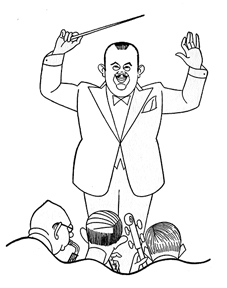In this chapter from his 1932 book, Times Square Tintypes, Broadway columnist Sidney Skolsky profiles rotund orchestra leader and the King of Jazz (or so he was once known), Paul Whiteman.
A LEADER AMONG MEN
PAUL WHITEMAN. Let the most important fact come first. He weighs 248 pounds.
He has a passion for striped ties and flashy autos.
Was born in Denver, March 28, 1890. His father and mother were both six feet tall. His father was director of musical education in the city schools. His mother sang in the choir.
Once he enlisted in the navy. Then he organized a naval jazz band.
His prize possession is a photograph of himself at the age of three. Here he is seen wearing green velvet pants and playing a toy violin.
He can lead an orchestra by merely shrugging his shoulders or moving his thumbs.
Was a viola player in the Denver Symphony Orchestra and drove a taxi on the side to make money.
Custard is his favorite dessert. He calls it “gap and swallow.”
The Prince of Wales is his pal.
He is married to Vanda Hoff, dancer. They have a son, Paul Whiteman, Junior.
One of his first jobs in a jazz band was in a honky-tonk in San Francisco. Here the folks threw coins in a barrel if they liked you. These coins were your salary.
He plays golf and has one friend he can beat.
Will pay any price for a musician he desires. Often takes men getting only $60 a week away from another band by paying them $250 a week.
Made his New York début at the Palais Royal.
The first place he heard jazz was at Capper’s Neptune Palace in Africa.
Has a remarkable memory, never forgetting the smallest detail. Commenting on this trait, a wisecracker gagged: “Oh, well, an elephant never forgets.”
Never passes a street musician without slipping him a bill.
Whenever he attends the opera he cries. His favorite opera is Parsifal.
For relaxation he will sit before a victrola listening to records of his band playing.
Eats very little for one of his size. Some of his choice dishes are chicken and cream served at the Claypool Hotel, Indianapolis; hot cakes, doughnuts and strawberry shortcake at his relatives’ in Denver; wienerwurst and sauerkraut at Joe’s in Minneapolis and antipasto at Sardi’s.
The first record he ever made was “Avalon.” It was spoiled in repeated trials by the audible soft oaths of players cursing their own mistakes.
The first of the Whitemans spelled it Wightman.
He wears pink nightgowns that fall to his ankles and a tassled night cap.
Studied with one teacher for four years. Then hired another teacher who spent four years teaching him not to do the things the first one had told him to do.
He can’t eat unless someone is sitting at the table with him.
Ferde Grofe makes the orchestrations for him. Grofe orchestrated “The Song of India” and “The Rhapsody in Blue” for him. These were the first pieces of jazz to be heard in Aeolian Hall.
Amuses himself at home by playing with toy locomotives.
His chief means of income in the old days was playing at parties for Ehret, the brewer. Got $1,000 a party.
Is sentimental and shy. Whenever a chorus girl tells him that she loves him (and it happens) he blushes profusely.
The dream of his life is to retire and spend the rest of his days on his 250-acre ranch near Denver.
He gets crying jags.
Lindburgh made the first non-stop flight to Paris, but everlasting fame still awaits the aviator who makes the first nonstop flight around Paul Whiteman. This is his own joke.
Talks to his band in pig Latin, a langauge he speaks fluently.
Likes to sit in his roadster parked near the stage door of the theater he is playing and hear the passers-by say: “Oh, look, there’s Paul Whiteman.”
He perspires freely. When rehearsing he discards his coat, vest, tie, and unbuttons his shirt. Always wears an old golf cap turned backward. Usually it take him forty minutes to rehearse a rehearse a number.
Is a hypochondriac. Whenever he goes on the road he takes a doctor with him.
When any member of his band is late for rehearsal he is fined. The man who has paid the most fines is Paul Whiteman.
Tells amusing parlor car stories somewhat in the literary manner of James Branch Cabell.
He was once fired from Taits, a San Francisco restaurant, because he couldn’t possibly play jazz.
Every Christmas he throws a party which never costs less than #3,000 and never breaks up until it is time for breakfast.
His hobby is collecting hotel signs. The prize of his collection is one that he picked up in Arizona. It reads: “Women—Do Not Take Men To Your Room. Ladies Will Not.
While making the picture, “The King of Jazz,” he staggered on the set and said: “I’ve just had a full night’s sleep. It’s the first time in years and darn near killed me.”
Although he may occasionally bawl out his men in a deep basso voice, he always uses baby talk to his wife.


